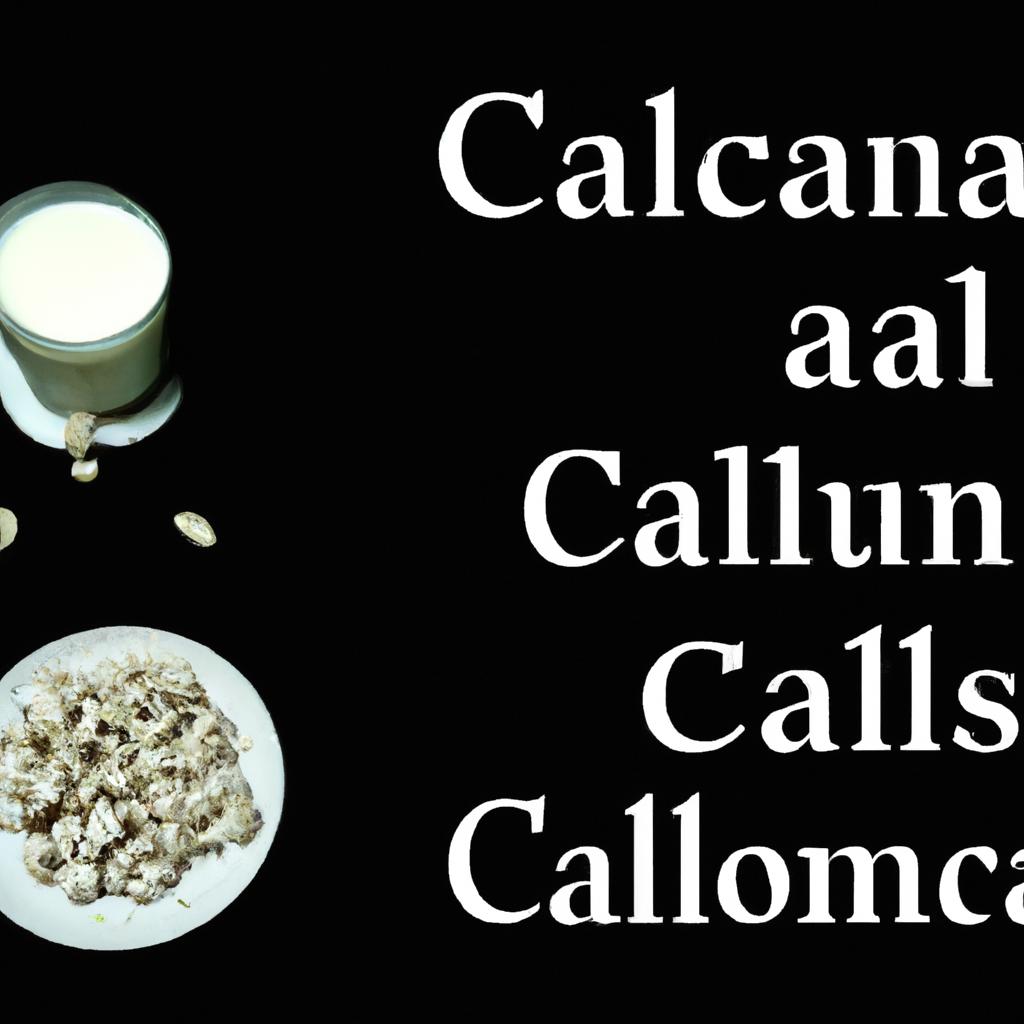**”The Role of Plant-Based Calcium in Athletic Performance: Strategies for Ensuring Adequate Intake for Optimal Bone Health and Muscle Function”**
The Role of Plant-Based Calcium in Athletic Performance: Strategies for Ensuring Adequate Intake for Optimal Bone Health and Muscle Function
Athletes often focus on macronutrients like proteins and carbohydrates, but micronutrients, particularly calcium, play a critical role in overall performance. While dairy products are well-known sources of calcium, many athletes are turning to plant-based diets for various reasons, including ethical concerns and health benefits. This article explores the importance of plant-based calcium for athletic performance and offers strategies for ensuring adequate intake to support optimal bone health and muscle function.
Understanding Calcium’s Role in Athletic Performance
Calcium is essential for several bodily functions, particularly in maintaining bone density and muscle contraction. Therefore, athletes need to ensure they consume enough calcium to support their demanding physical activities.
Bone Health
Adequate calcium intake is crucial for maintaining bone health, especially in athletes who subject their bodies to high-impact activities. Low calcium levels can lead to decreased bone density, increasing the risk of fractures. Furthermore, this risk is particularly pronounced in athletes undergoing rigorous training, which can deplete calcium reserves.
Muscle Function
Calcium plays a vital role in muscle contraction. The mineral activates proteins in muscle cells, allowing them to contract and relax efficiently. Consequently, inadequate calcium levels may lead to muscle cramps, fatigue, and poor athletic performance.
Plant-Based Sources of Calcium
Transitioning to a plant-based diet does not mean sacrificing calcium intake. Many plant foods are rich in this essential mineral. In fact, there are several excellent sources of plant-based calcium that athletes can incorporate into their diets.
Leafy Greens
Dark leafy greens, such as kale, collard greens, and bok choy, are packed with calcium. For instance, one cup of cooked collard greens contains about 360 mg of calcium. Moreover, these vegetables are rich in vitamins and minerals that contribute to overall health.
Fortified Foods
Many plant-based products, including plant milks (such as almond, soy, and oat milk) and breakfast cereals, are fortified with calcium. Therefore, checking the labels of these products can help athletes find additional sources of calcium in their diets.
Nuts and Seeds
Almonds and sesame seeds are excellent sources of calcium. For example, just one ounce of almonds provides around 76 mg of calcium, while two tablespoons of sesame seeds can offer about 280 mg. Including these snacks in your diet can help meet your calcium needs while providing healthy fats and protein.
Strategies for Ensuring Adequate Calcium Intake
To ensure that athletes are consuming enough plant-based calcium, they can adopt several strategies.
Diversify Your Diet
Eating a diverse range of foods can help ensure adequate calcium intake. Incorporate various calcium-rich foods throughout the day. For example, adding leafy greens to salads, smoothies, and stir-fries can significantly increase calcium consumption. Moreover, rotating different sources of calcium can prevent dietary boredom and promote overall nutrition.
Consider Supplements
In some cases, especially for athletes with higher calcium needs or those who have difficulty meeting their needs through food alone, calcium supplements may be beneficial. However, it’s essential to consult with a healthcare provider or a registered dietitian before starting any supplementation regimen to avoid excessive intake.
Timing Matters
Consuming calcium-rich foods around training sessions can enhance muscle function and recovery. For instance, having a calcium-fortified smoothie post-workout can aid in replenishing necessary nutrients while promoting muscle recovery. Therefore, timing your calcium intake can maximize its benefits.
Health Benefits Beyond Athletic Performance
In addition to supporting bone health and muscle function, plant-based calcium offers several other health benefits that can positively influence athletic performance.
Heart Health
Calcium is important for cardiovascular health, helping to regulate blood pressure and maintain a healthy heartbeat. Moreover, a balanced diet rich in calcium and other nutrients can reduce the risk of heart disease, allowing athletes to maintain better overall health.
Weight Management
Plant-based diets are often lower in calories and higher in fiber, which can support healthy weight management. Consequently, maintaining an optimal weight can enhance athletic performance and reduce the risk of injury.
Conclusion
In conclusion, plant-based calcium plays a vital role in supporting athletic performance by ensuring optimal bone health and muscle function. By diversifying their diets, considering supplements when necessary, and timing their calcium intake effectively, athletes can meet their calcium needs while enjoying the benefits of a plant-based lifestyle. Moreover, the additional health benefits associated with a plant-based diet further enhance overall well-being and performance. Therefore, athletes should embrace plant-based calcium sources as an essential component of their nutrition strategy, ensuring they are well-equipped for their athletic endeavors.
FAQ
Why is calcium important for athletes?
Calcium is crucial for athletes as it plays a significant role in maintaining bone density and muscle function. Adequate calcium intake helps prevent decreased bone density, which can increase the risk of fractures, especially in athletes involved in high-impact activities. Additionally, calcium is essential for muscle contraction; insufficient levels can lead to muscle cramps, fatigue, and ultimately hinder athletic performance.
What are some plant-based sources of calcium that athletes can incorporate into their diets?
Athletes can find several excellent plant-based sources of calcium, including dark leafy greens like kale and collard greens, which are rich in the mineral. Fortified plant-based products, such as almond, soy, and oat milk, and breakfast cereals are also great options. Additionally, nuts and seeds, particularly almonds and sesame seeds, are high in calcium and can be easily included as snacks in a plant-based diet.
What strategies can athletes use to ensure they are getting enough calcium on a plant-based diet?
Athletes can adopt several strategies to ensure adequate calcium intake, such as diversifying their diets by incorporating a variety of calcium-rich foods throughout the day. They may also consider calcium supplementation if their dietary intake is insufficient, but should consult a healthcare provider first. Moreover, timing calcium intake around training sessions—such as consuming a calcium-fort















Post Comment